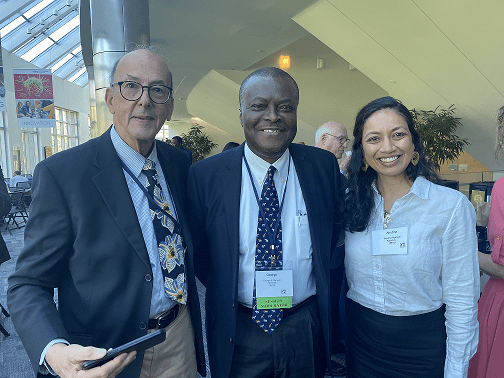Spotlight on Global Cardiovascular Health: A Conversation with Anubha Agarwal, MD

A frequent Global Health Center collaborator, Anubha Agarwal, MD, MSc is an assistant professor of medicine and a cardiologist in the Division of Cardiology at Washington University in St. Louis. Her clinical training is in non-invasive cardiology and she has specific research expertise in global cardiovascular health. Clinical care of patients in the United States combined with global health field experience has inspired her commitment to improving the cardiovascular health of vulnerable populations worldwide through the dedicated pursuit of late-stage translational research as a global cardiovascular physician-scientist.
What is your latest research and what do you hope to accomplish?
As a NIH/Fogarty Global Health Fellow from 2017 to 2018 in India, I led team study on the effect of a quality improvement toolkit among 1,400 participants hospitalized with heart failure in eight hospitals in Kerala, demonstrating improvement in guideline-directed medical therapy. Despite the improvement in this key outcome, more than half of eligible patients with heart failure need additional strategies to improve care such as a polypill, which combines several medications into one pill to improve adherence.
I have received funding from the NIH to gain advanced training in implementation science, clinical trial methods, and regulatory science for global pharmacological clinical trials to become an independent investigator as a global heart failure clinical trialist with expertise in cardiovascular implementation science. Importantly, the polypill for patients with heart failure has the potential to transform heart failure care through simplified care by shifting heart failure care simply by shifting how we treat patients from multiple pills to one pill a day.
I have progressed significantly since my Fogarty year due to phenomenal mentorship. Now, when I think about my leadership priorities, mentorship is at the forefront.
Anubha Agarwal
The overarching goal of Dr. Agarwal’s NIH/Fogarty Global Health Fellowship year was to answer the question: How can we improve heart failure care in South India? She worked in the state of Kerala, where her first step was to conduct a systematic review of existing heart failure intervention programs. While many improvement programs existed, all had been studied and refined in high-income countries, making it a challenge to understand how they might work in low-income settings. Agarwal and her colleagues then took that data and conducted qualitative interviews with physicians, nurses, patients, and pharmacists, asking them what they think needed to be done to improve heart failure care. From there, they designed their quality improvement intervention and tested it amongst 1,400 heart patients in Kerala over six months.
Using her Fogarty data, Agarwal applied for and was awarded a Pathway to Independence grant from the National Heart, Blood, and Lung Institute. With this grant, she and her team will work again in Kerala evaluating a polypill that combines four different classes of medications into one pill for patients with heart failure. Her mentors on this related project are a direct extension of her Fogarty experience.
Agarwal is as an assistant professor and co-director of the global cardiovascular health program at Washington University. She spends about a quarter of her time working with patients; the rest is spent on research related to her project in Kerala.